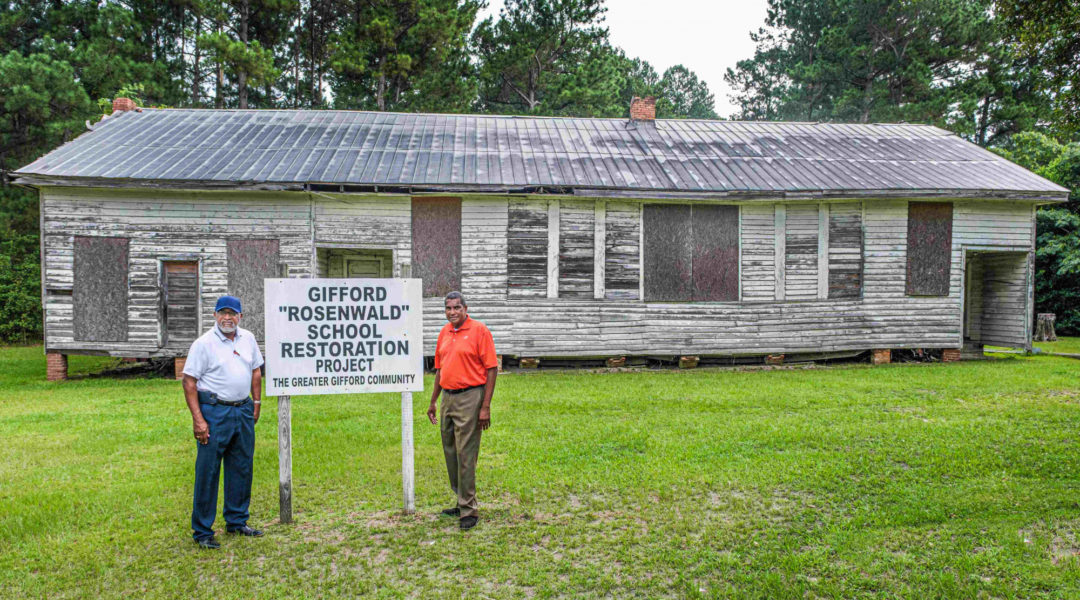Endowment Funds
Ensuring the Past is Preserved into the Future
February 03, 2022
A rich, yet often untold, story is unfolding across the South. In Hampton County, the Arnold Fields Community Endowment - Projects Fund is at the forefront. The people behind this fund, along with a church and a municipality, are currently working to restore the Gifford Rosenwald School. If you’re unfamiliar with Rosenwald Schools, you’re not alone. Like many pieces of Black history, the story of Rosenwald Schools remains largely unknown.
In the early 1900s, Booker T. Washington, prominent educator and founder of Tuskegee Institute, approached Julius Rosenwald, a German-Jewish immigrant and president of Sears, Roebuck & Company, with a plan: build new schools, exclusively for Black children, across the segregated South. It was the era of Jim Crow; Black students were provided sub-standard schools, if they had them at all.
Between 1917 and 1932, close to 5,000 new schools were built. The Rosenwald Fund paid half the cost and the communities where schools were built donated the land and raised matching funds to cover the remaining costs. The schools followed predetermined architectural plans and donned plain exteriors to avoid unwanted attention, but they were state-of-the art, with large windows facing east and west to capture natural light. These Rosenwald Schools served more than 700,000 Black children for four decades.
Today, only about 500 of these schools remain, many of them in disrepair. One of them sits in Gifford, a town in Hampton County.
A national effort to restore these schools – and this fascinating history – is underway. Charlie Grant, Jr. and Roy Hollingsworth are leading the charge in Hampton County, using their endowment fund at the Community Foundation. “There were four Rosenwald Schools built in Hampton County,” Grant says. “Each school site has a historical marker, but only the Gifford school is still standing.”
The school sits on Highway 321, in an open lot. However, that wasn’t always the case. “I played softball there. I parked right by it and never saw it,” Hollingsworth says. “It was covered in vegetation, which probably helped preserve it.”
The school was on property owned by the Church of God and Christ. For years the church used the school as their place of worship. When the congregation built a new church, the school was abandoned, and the church eventually deeded the school to the Town of Gifford. The church, the town and the endowment have partnered to renovate the school and eventually create a community library and small exhibition site.
This is only part of a larger plan Grant and Hollingsworth envision. “Our idea is to create a regional Rosenwald School trail,” Grant says. “We can start with Gifford, spread to the region (Beaufort, Colleton, Hampton and Jasper Counties), and become a model for the state.”
With growing interest in Black history sweeping the country, they believe the potential increased tourism dollars could benefit the region. And their endowment fund at the Community Foundation will be there to support their plans both now and in the future – by preserving the story of their past.
To support the renovation of the Gifford Rosenwald School, you can donate to the Arnold Fields Community Endowment Projects Fund (Gifford Rosenwald School Project) at https://cflowcountry.civicore.com/ArnoldFieldsCommunityEndowmentProjectsFund.
You can learn more about Rosenwald Schools at https://www.smithsonianmag.com/history/how-rosenwald-schools-shaped-legacy-generation-black-leaders-180977340/ or https://www.cbsnews.com/video/impact-of-rosenwald-schools-on-education-and-how-they-changed-the-lives-of-black-americans/
